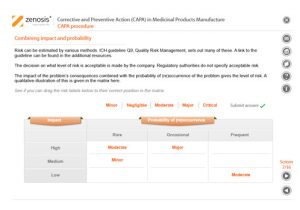Corrective and Preventive Action (CAPA) in Medicinal Products Manufacture
Course Summary
A company’s Corrective and Preventive Action (CAPA ) system establishes how personnel should deal with manufacturing problems that have occurred or that may occur if not prevented. This module explains the principles of corrective and preventive action and describes typical CAPA procedure. It goes on to introduce root cause analysis and outline the role of progress tracking, escalating, and trending of CAPA procedures.

Purchasing Information
When you have completed your course order, Zenosis will finalise the setup of your course materials and contact you on the email address that you provide in your order. You can expect this process to be completed within one business day (using the UK business calendar) of completing your payment.
It is therefore essential that you use your real email address for your order, or indicate in the purchase notes the email address to be used for the course set-up, and check that any messages from Zenosis or grapl are not lost in your junk or spam folder.
You will have access to the course module(s) for a period of 180 days after your purchase is complete.
Detailed Course Information
• Explain what a CAPA system is and describe how it operates in a company’s Quality Management System
• Describe how a typical CAPA procedure is carried out
• Outline the purpose and practice of root cause analysis
• Discuss the role of progress tracking, escalating, and trending of CAPA procedures
This module provides essential training for all personnel who work in a manufacturing environment in the pharma/biotech industry.
Module overview – An outline of the module’s scope and objectives, and notes on terminology.
CAPA principles – In this session we explain what a CAPA system is and why it is important. We explain the differences among correction, containment, corrective action, and preventive action. We specify sources of information about manufacturing problems, and we emphasise the importance of documentation of a CAPA system.
CAPA procedure – Problems that may give rise to CAPAs are best tackled by systematically progressing through a number of stages of procedure. In this session we set out the typical stages of a CAPA procedure, along with the questions to be addressed and the actions taken at each stage.
Root cause analysis – Root cause analysis is a rigorous approach to finding the deepest causes of problems. In this session we emphasise the value of applying CAPA to root causes rather than their symptoms. We set out the stages of a typical analysis, and we list examples of tools for finding causes and studying trends.
Tracking, escalation, and trending – One of the most common findings of regulatory inspectors is the lack of effective and timely closure of CAPA reports. In this short session we emphasise the importance of tracking the progress of CAPA procedures, escalating issues, and reviewing trends in the CAPA system.
Assessment – Multiple-choice mastery assessment.
